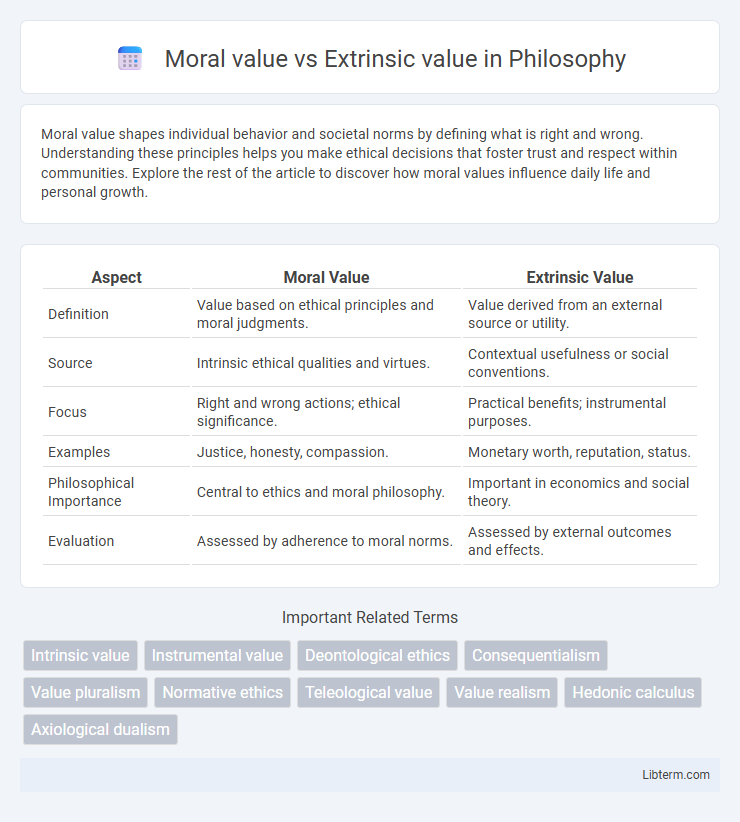Moral value shapes individual behavior and societal norms by defining what is right and wrong. Understanding these principles helps you make ethical decisions that foster trust and respect within communities. Explore the rest of the article to discover how moral values influence daily life and personal growth.
Table of Comparison
| Aspect | Moral Value | Extrinsic Value |
|---|---|---|
| Definition | Value based on ethical principles and moral judgments. | Value derived from an external source or utility. |
| Source | Intrinsic ethical qualities and virtues. | Contextual usefulness or social conventions. |
| Focus | Right and wrong actions; ethical significance. | Practical benefits; instrumental purposes. |
| Examples | Justice, honesty, compassion. | Monetary worth, reputation, status. |
| Philosophical Importance | Central to ethics and moral philosophy. | Important in economics and social theory. |
| Evaluation | Assessed by adherence to moral norms. | Assessed by external outcomes and effects. |
Understanding Moral Value: A Conceptual Overview
Moral value refers to intrinsic worth based on ethical principles, guiding actions and judgments about right and wrong independent of external benefits. It contrasts with extrinsic value, which assigns worth to objects or actions based on their usefulness or consequences outside themselves. Understanding moral value involves recognizing its foundational role in shaping human behavior, ethics, and societal norms beyond mere instrumental considerations.
Defining Extrinsic Value in Modern Contexts
Extrinsic value in modern contexts refers to the worth an object or action holds due to external factors, such as its utility, social recognition, or economic benefit, rather than intrinsic qualities. This value is often measured by market demand, functionality, or the role the item plays in achieving personal or societal goals. Understanding extrinsic value is crucial in fields like economics, environmental studies, and ethics, where the distinction between inherent worth and external benefits influences decision-making and policy development.
Core Differences Between Moral and Extrinsic Values
Moral values are principles that guide behavior based on notions of right and wrong, often rooted in ethical beliefs and cultural norms, while extrinsic values refer to the worth assigned to objects or actions based on external rewards or outcomes such as money, status, or recognition. Core differences include the intrinsic nature of moral values, which prioritize inherent goodness, versus the instrumental nature of extrinsic values, which depend on external validation and consequences. Understanding this distinction is crucial for ethical decision-making and evaluating motivations behind human actions.
The Role of Moral Value in Ethical Decision-Making
Moral value plays a crucial role in ethical decision-making by guiding individuals to prioritize principles such as honesty, fairness, and respect over external rewards or social approval. Unlike extrinsic value, which relies on outcomes like money, status, or praise, moral value anchors decisions in inherent rightness and ethical integrity. This intrinsic focus fosters consistent, principled actions that uphold societal norms and personal conscience.
How Extrinsic Value Shapes Human Behavior
Extrinsic value, rooted in external rewards such as money, status, or praise, significantly shapes human behavior by motivating individuals to pursue goals that yield tangible benefits. Unlike moral value, which is guided by internal principles and ethical considerations, extrinsic value drives actions based on practical outcomes and social recognition. This external incentive structure influences decision-making processes, often prioritizing achievements that enhance social standing and material gain over intrinsic or moral satisfaction.
Historical Perspectives on Value Systems
Historical perspectives on value systems reveal that moral values, rooted in ethical principles and cultural norms, have historically guided human behavior and societal cohesion more deeply than extrinsic values, which emphasize external rewards like wealth or status. Philosophers such as Aristotle emphasized intrinsic virtues as central to a flourishing life, while economic theories during the Enlightenment shifted focus toward extrinsic values tied to utility and market exchanges. The evolution from predominantly moral frameworks to incorporating extrinsic incentives reflects changing societal priorities and the complex interplay between ethical imperatives and material gains.
Philosophical Debates: Intrinsic vs. Extrinsic Value
Philosophical debates on moral value often hinge on the distinction between intrinsic and extrinsic value, where intrinsic value refers to the inherent worth of an entity or action independent of external consequences. Intrinsic moral values are considered valuable in themselves, such as happiness or virtue, whereas extrinsic value depends on outcomes or relational properties, like wealth or social status. This dichotomy shapes ethical theories, influencing arguments about what ought to be pursued for its own sake versus what is valuable as a means to an end.
Real-World Examples: Moral vs. Extrinsic Motivations
Moral values guide actions based on ethical principles, such as whistleblowers exposing corruption to uphold justice despite personal risk. Extrinsic values prioritize external rewards, exemplified by employees working overtime solely for bonuses or promotions. Real-world motivations often blend these, but moral-driven decisions emphasize integrity over material gain.
Impacts of Value Prioritization on Society
Prioritizing moral values in society fosters ethical behavior, social cohesion, and long-term well-being by emphasizing principles such as justice, honesty, and respect for human rights. In contrast, focusing on extrinsic values like wealth, status, and material success often leads to increased inequality, reduced community trust, and short-term gratification at the expense of collective welfare. Societies that balance moral and extrinsic values tend to experience sustainable development, stronger social bonds, and improved overall quality of life.
Balancing Moral and Extrinsic Values in Everyday Life
Balancing moral values and extrinsic values in everyday life requires aligning personal ethics with external rewards such as money, status, or recognition without compromising integrity. Prioritizing moral principles ensures long-term fulfillment, while considering extrinsic values can motivate practical decisions and societal success. Integrating both aspects promotes holistic well-being and sustainable relationships in professional and personal contexts.
Moral value Infographic

 libterm.com
libterm.com